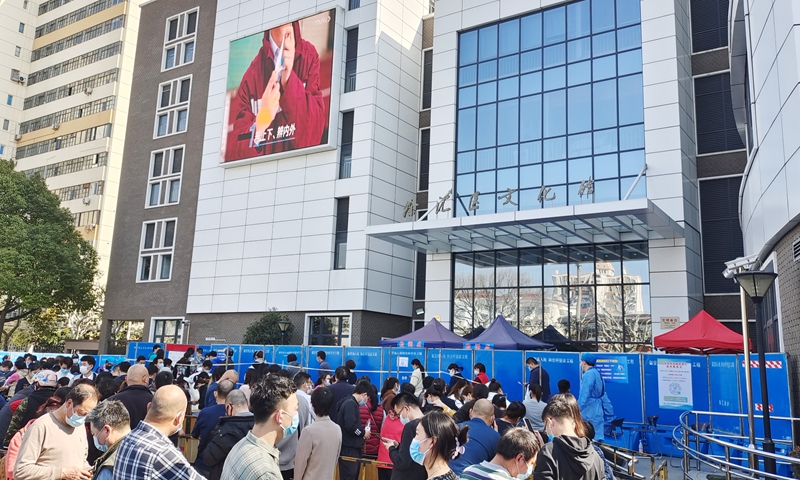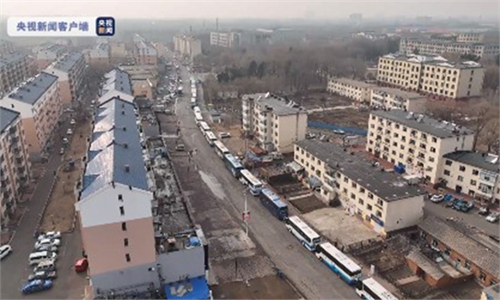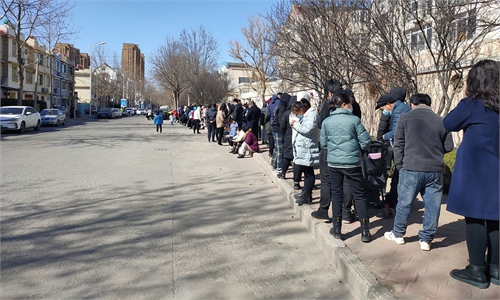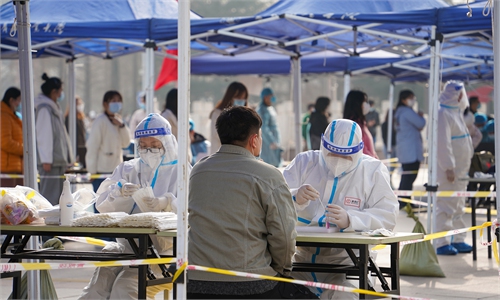
Local Shanghai residents queue up for a nucleic acid test at a cultural center in Xuhui district on March 12, 2022. Photo: VCG
Shanghai-based renowned infectious disease expert Zhang Wenhong said that it is not time for China to lie flat and debate over zero-COVID and co-existence, instead, we should take the period as an opportunity to lay out anti-epidemic strategies that are complete, sustainable and with more wisdom.
Zhang made the remarks in a post on China's Twitter-like Sina Weibo on Monday, in which he said that it is "the most difficult period" for China since the COVID-19 pandemic broke out two years ago.
A fifth wave of the epidemic hit Hong Kong Special Administrative Region after the Spring Festival and it was just about one month it was just about one month for the city to lose control of the epidemic, Zhang said, noting that most infections discovered in Hong Kong and the mainland are caused by the Omicron BA.2 variant. It's spreading very fast this time, Zhang said.
On the mainland, Zhang said his team discovered that China stayed in a very low level of epidemic in February and kept controlling the total number of domestically transmitted infections under 200. But since March 1 to 12, the daily new cases surged from 119 to 3,122 in 11 days, despite nationwide active epidemic supervision, prevention and control measures.
Many Chinese cities are flummoxed by the sudden sporadic outbreaks, including Shanghai. But, as our fights against the virus would last, we should not lose our pace or confidence in the epidemic prevention and control, Zhang said.
To clear the infections, Shanghai has slowed down. We believe that no matter how fast BA.2 is, we can get it under control as long as we slow down, Zhang said.
The sudden outbreaks have also brought more experiences for China in understanding the virus. Zhang said that he had discussed with virologists from the University of Hong Kong. They highly agreed that the virulence of the novel coronavirus had receded. Most of the deaths in Hong Kong are elderly people or people have chronic diseases.
Basically, people with normal immunity and those who have accepted booster shots, no matter what kind of vaccines, will be fine, Zhang said, noting that not to be afraid is the first step we have to take.
Zhang stressed the importance to get vaccines. According to data collected in Shanghai in the past six months, 94 percent of 2,266 infections in the city, most of which were imported, were vaccinated, while only 0.1 percent of them got serious diseases, none was in critical condition or died.
Zhang noted that about 90 percent of international travelers at present are vaccinated and about five percent of them have tested positive. This means that vaccination could not prevent breakthrough infections, but has indeed brought the rate of severe illnesses and deaths lower than the flu.
Data in Hong Kong also showed that 89.4 percent of patients who died did not receive vaccines or received only one shot. The death rate of people receiving two shots is 0.09 percent, while that of those receiving less than two shots is 2.03 percent.
However, Zhang noted that it is still not time for China to lie flat. We should have more clearer methods for the future rather than debating over zero-COVID or co-existence.
If China reopens quickly at this time, new cases would surge in a short time. The domestic medical system would be overloaded and the society grind to a halt, causing irreparable damages, Zhang explained.
According to data revealed by the Chinese National Health Commission (NHC) in late February, vaccination among people aged 60 and above in the country was still comparatively low with more than 200 million who had received two shots, accounting for about 80 percent of the group. Among those aged 80 and above, nearly 20 million had received two shots.
The vaccination of the total Chinese population was about 90 percent by late February, according to NHC data.
The recent situation has shown that the Chinese society is not ready to face a large number of cases neither psychologically nor in terms of social resource allocation, Zhang said.
Thus, it is very vital for China to continue the zero-COVID strategy to put the Omicron epidemic at a very low level, but it does not mean that we should constantly lock down cities and conduct mass testing, Zhang said, noting that we should take this time's epidemic as an opportunity to lay out anti-epidemic strategies that are complete, sustainable and with more wisdom.
The strategies include letting more elderly people to get booster shots, better vaccines and vaccination strategies, widely accessible oral drugs, easily accessible and cheap testing kits for self-testing, effectively trained hierarchical medical system, home quarantine procedures, a complete anti-epidemic system and abundant medical preparations.
It is not time to lie flat if we have not made these preparations, Zhang said.
This time the epidemic came out suddenly, but it is just a cold snap. When we have a clear picture for the future and the upcoming spring, we will have nothing to be afraid of, Zhang said.
Global Times



